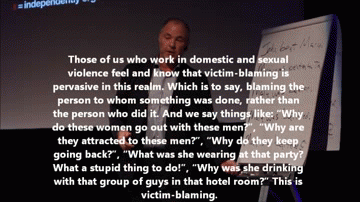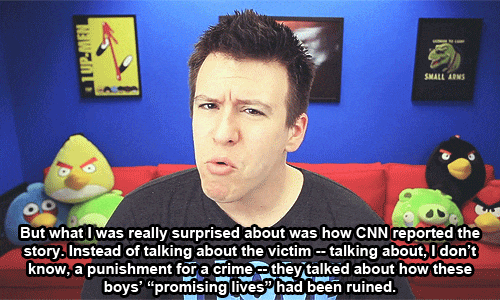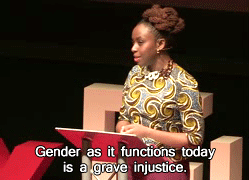What is rape culture?
Rape culture is a complex SET of beliefs and practices that encourages sexual aggression, supports violence against women, sees violence as sexy, and sexuality as violent. This includes jokes, advertising, music, television, laws, words, and images that make violence against women and sexual coercion seem so normal that people believe rape is inevitable, even natural . Not surprising in a country where someone is sexually assaulted every two minutes. Yet, as a society, we have become uncomfortable with talking about rape culture, gender, and anything that dismantles the very patriarchal culture that tells us not to disrupt the status quo.
According to the Rape Crisis Center, 1 in 6 American women are victims of rape in their lifetime, with increased statistics on college campuses and in other countries. This is not something to ignore, and as Clementine Ford states, "The way that we talk about rape as if it is some arbitrary thing that just happens to women, that we just walk out of the door one day and just accidentally step in a puddle of it because we weren't paying attention, that's how we remove responsibility from the problem."
I spent an entire semester researching rape culture for two of my classes and found that rape culture is everywhere. Rape culture is when Robin Thicke repeats, "I know you want it," 18 times in his hit single. It's when Bud Light releases a campaign with the slogan, "The perfect beer for removing 'no' from your vocabulary for the night." Rape culture makes itself clear when two boys rape an incapacitated girl, and every news station focuses on the shambled futures of the "football stars."
The problem with rape culture is that we have labeled it a women's issue, shifting the blame from the perpetrator to the victim, implying that it is a woman's job to not get raped. By telling girls to change what they are wearing, not be out alone at night, and carry pepper spray just in case, we have done a great injustice to women. As Chimamanda Ngozi Adichie explained, "We teach girls shame. Close your legs, cover yourself. We make them feel as though by being born female they are already guilty of something. So girls grow up to be women who cannot say they have desire, women who silence themselves, who cannot say what they truly think." It has become so ingrained in our minds that public space is a male-dominated space that we cause women to live in fear.

We have also taught men to believe that his sense of self is determined by exercising his sexual dominance and aggression. Chimamanda adds, "We must raise our daughters differently. We must also raise our sons differently. We do a great disservice to boys in how we raise them. We stifle the humanity of boys. We define masculinity in a very narrow way. Masculinity becomes this hard, small cage, and we put boys inside the cage."
Looking forward, we need to understand the foundation of what constitutes this acceptance of rape in order to change the way the culture functions. We must focus on not only ending the victim blaming, but also on teaching our children to not rape rather than advising young girls how to avoid getting raped. Our efforts to stop violence toward women must address the attitudes about gender roles that begin from a young age and the misogynistic systems that promote this violence. I have only begun to touch on the complexity of rape culture, and I encourage everyone to watch Clementine Ford's Ted Talk to better understand this topic—trust me, it's worth the 12 minutes.






















